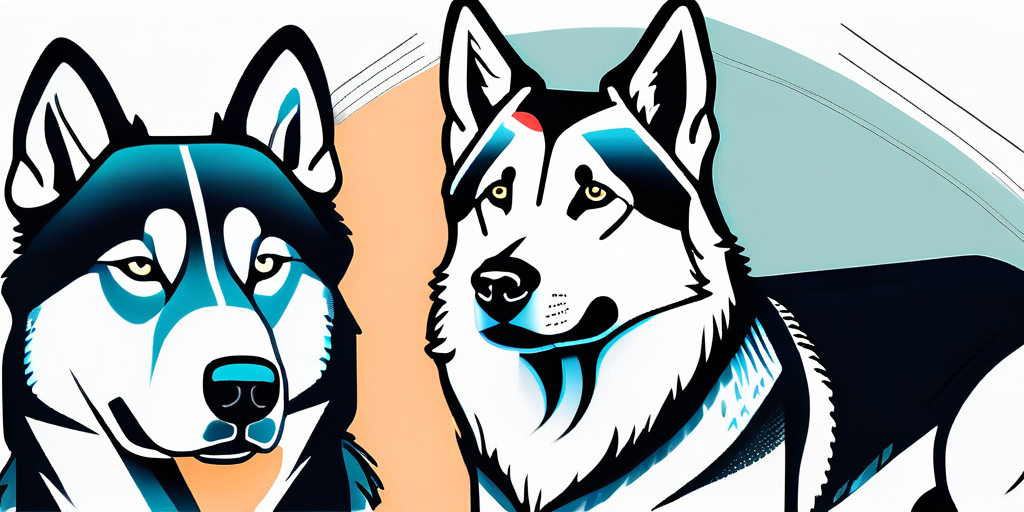If you’re considering adding a furry friend to your family, you may be torn between two popular breeds: the Husky and the German Shepherd. Both breeds have their own unique qualities, but which one is the right fit for you? In this article, we will take a closer look at the history, physical characteristics, temperament, training needs, and health of both breeds to help you make an informed decision.
Understanding the Breeds
The History of Huskies
Originating from Siberia, Huskies were bred by the Chukchi people to be sled dogs. These dogs were highly valued for their endurance, speed, and ability to withstand cold climates. In the early 20th century, Huskies gained popularity in Alaska during the Nome Gold Rush when they were used to deliver lifesaving medicine.

Huskies are known for their striking appearance with their thick double coats, erect triangular ears, and distinctive facial markings. Their friendly and gentle temperament makes them excellent family pets, although they still retain their strong prey drive and need for regular exercise. Huskies are energetic and playful, often dubbed as “escape artists” due to their cleverness in finding ways to explore beyond boundaries.
The History of German Shepherds
German Shepherds, also known as Alsatians, trace their roots back to Germany in the late 19th century. They were originally bred to be herding dogs, helping shepherds with the management and protection of their flocks. Later on, their intelligence, loyalty, and versatility led to their utilization in various roles such as police work, search and rescue, and as assistance dogs.
German Shepherds are renowned for their courage, confidence, and ability to learn complex tasks quickly. Their strong work ethic and eagerness to please make them highly trainable and adaptable to various environments. With proper socialization and training, German Shepherds can excel in obedience, agility, and even as therapy dogs, providing comfort and support to those in need.
Physical Characteristics
Appearance of Huskies
Huskies are known for their stunning looks. They have a medium-sized build with well-muscled bodies, erect ears, and expressive eyes. Their thick double coat comes in a variety of colors and patterns, including black, gray, red, and white. Huskies are distinguishable by their proud and wolf-like appearance.
One of the most striking features of Huskies is their unique facial markings, often including masks, spectacles, and striking patterns that add to their captivating appearance. Their almond-shaped eyes can be blue, brown, or even one of each, giving them an intense and mesmerizing gaze that is hard to resist. Huskies also have a graceful and agile gait, reflecting their history as sled dogs in harsh Arctic conditions.
Appearance of German Shepherds
German Shepherds are strong and well-proportioned dogs. They have a muscular body, erect ears, and an intelligent expression. Their double coat is dense and typically comes in black, black and tan, or sable colorations. German Shepherds have a confident and noble appearance.
One notable feature of German Shepherds is their iconic saddle pattern, where the darker color covers their back and sides, giving them a regal and distinguished look. Their alert and attentive ears not only contribute to their appearance but also serve a practical purpose in helping them excel as working dogs. German Shepherds’ strong and sturdy build reflects their versatility in various roles, from loyal family companions to dedicated service animals in law enforcement and search and rescue operations.
Temperament and Personality Traits
The Husky Personality
Huskies are known for their friendly and outgoing nature. They are sociable dogs that thrive on companionship and are generally good with people, including children. However, Huskies have a strong independent streak and can be mischievous at times. They have a strong prey drive and may not get along well with small animals.
One fascinating aspect of Huskies is their history as sled dogs in cold climates. Their endurance and strength were crucial for pulling heavy loads across vast snowy landscapes. This background has instilled in them a high level of energy and a need for regular exercise to keep them mentally and physically stimulated. Without proper outlets for their energy, Huskies may exhibit destructive behaviors.
The German Shepherd Personality
German Shepherds are known for their loyalty, courage, and protective nature. They are typically affectionate with their family members and make excellent guard dogs. German Shepherds are highly intelligent and eager to please, making them trainable in various tasks. However, their protective instincts can make them wary of strangers, requiring proper socialization from an early age.
German Shepherds have a rich history of serving as working dogs, including roles in law enforcement, search and rescue, and military operations. Their versatility and adaptability have made them one of the most popular breeds for various tasks that require intelligence, agility, and obedience. Despite their serious demeanor when on duty, German Shepherds can also be loving and gentle companions within their families, forming strong bonds with their human pack members.
Training and Exercise Needs
Training a Husky
Huskies can be a bit challenging to train due to their independent nature and strong instincts. However, with patience, consistency, and positive reinforcement methods, they can be trained effectively. It’s essential to establish yourself as the pack leader and provide mental stimulation through interactive toys and puzzles.

When training a Husky, it’s important to understand that they have a high prey drive and may have a tendency to wander off if not properly secured. Using a harness or a secure leash during walks is crucial to prevent them from running off in pursuit of an interesting scent or animal. Additionally, incorporating regular exercise into their routine, such as long walks or jogs, can help satisfy their need for physical activity and prevent destructive behaviors.
Training a German Shepherd
German Shepherds are highly intelligent and trainable dogs. They excel in obedience training and can learn complex tasks quickly. Positive reinforcement methods, such as rewards and praise, work best with this breed. German Shepherds also thrive in activities that engage both their mind and body, such as agility training and advanced obedience.
Due to their protective nature, German Shepherds require early socialization to ensure they are well-adjusted and friendly towards strangers. Exposing them to different environments, people, and animals from a young age can help prevent any potential aggression or fearfulness. In addition to mental stimulation, German Shepherds also need regular physical exercise to maintain their muscle tone and overall health. Activities like fetch, running, or hiking are great ways to keep them physically active and mentally stimulated.
Health and Lifespan
Common Health Issues in Huskies
Like any breed, Huskies are prone to certain health conditions. Some common issues include hip dysplasia, eye problems (such as cataracts and progressive retinal atrophy), and certain autoimmune diseases. Regular exercise, a balanced diet, and routine veterinary care can help mitigate these risks.
Additionally, Huskies are known to be prone to skin conditions such as dermatitis and allergies. Their thick double coat requires regular grooming to prevent matting and skin infections. It’s important to provide them with a cool environment during hot weather to prevent heatstroke, as they are sensitive to high temperatures due to their origins in cold climates.
Common Health Issues in German Shepherds
German Shepherds are also susceptible to specific health problems. They may experience hip and elbow dysplasia, degenerative myelopathy, and digestive issues. Responsible breeding practices, regular exercise, and a nutritious diet can help promote their overall health and longevity.
In addition to the mentioned health issues, German Shepherds are known to be predisposed to bloat, a serious condition where the stomach fills with gas and twists on itself. This can be life-threatening and requires immediate veterinary attention. Regular dental care is also essential for German Shepherds, as they are prone to dental problems like tartar buildup and gum disease.
Both the Husky and the German Shepherd are incredible breeds with unique characteristics. Ultimately, the right choice depends on your lifestyle, experience with dogs, and preferences. If you enjoy an active lifestyle, have time for exercise and training, and need a loyal and protective companion, the German Shepherd may be the breed for you. On the other hand, if you’re looking for a sociable and friendly dog that thrives in colder climates and has striking looks, the Husky might be the perfect fit. Consider these factors carefully and choose the breed that best aligns with your needs and expectations. Regardless of your choice, both breeds have the potential to bring joy, love, and companionship to your life.
Find Your Perfect Breed Match with BreedRead
Deciding between a Husky and a German Shepherd is just the beginning of your journey with your new canine companion. At BreedRead.com, we provide you with all the resources you need to make an informed decision and ensure a happy life for you and your dog. From in-depth breed comparisons to tailored care guides, our free online platform is dedicated to supporting dog lovers like you. Subscribe to our free newsletter today and gain access to expert advice that will help you choose, train, and care for the breed that’s right for you.

